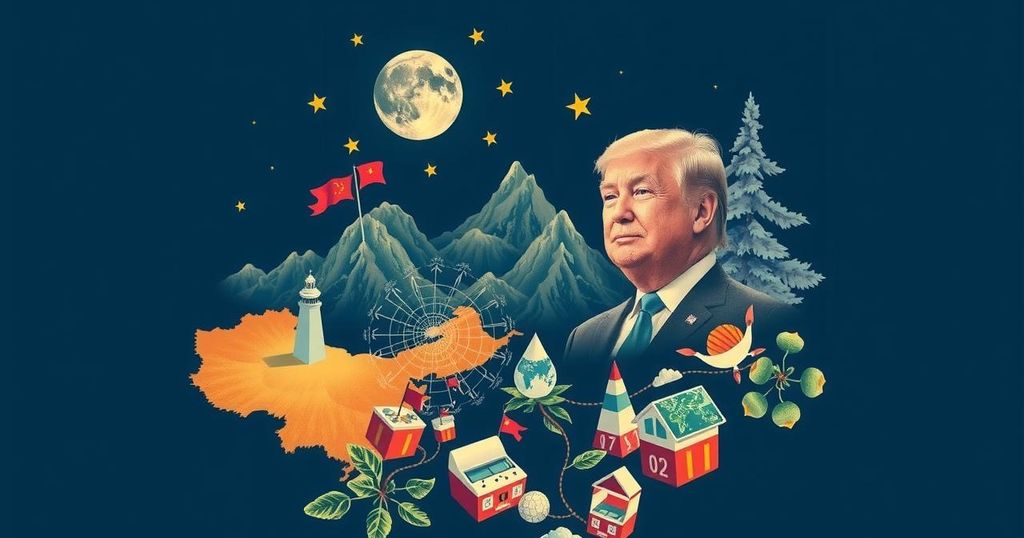Climate change
AF, ASIA, AZERBAIJAN, BAKU, BELINDA SCHAEPE, CENTRE FOR RESEARCH ON ENERGY AND CLEAN AIR, CLIMATE CHANGE, CLIMATE JUSTICE, DING XUEXIANG, DONALD TRUMP, ENVIRONMENTAL POLICY, EUROPE, GEOPOLITICS, GERMANY, GREENHOUSE GAS EMISSIONS, JENNIFER MORGAN, NORTH AMERICA, PARIS AGREEMENT, UNITED STATES, WHITE HOUSE
Marcus Li
0 Comments
China Embraces Leadership Role in Climate Diplomacy as Trump Returns
As Donald Trump returns to the presidency, China is seizing the opportunity to portray itself as a leader in climate action. During COP29, China displayed a cooperative approach while disclosing its climate finance contributions, resisting pressure to be classified as a donor. Analysts predict tensions in U.S.-China relations, suggesting China’s climate leadership might be fortified by Trump’s skepticism towards international climate collaborations.
As Donald Trump is poised to return to the White House, the prospect of the United States withdrawing from climate diplomacy again presents China with an opportunity to assert itself as a global leader in climate action. During the COP29 climate talks in Baku, China aimed to portray a cooperative stance, disclosing details on its international climate financing while resisting calls to be recognized as a donor nation. This approach marks a notable shift from the contentious interactions of the previous year during COP28 in Dubai, where China and the United States collaborated on a pivotal resolution urging a global transition away from fossil fuels. However, many analysts foresee that the rapport between China and the United States, which together account for a significant portion of global greenhouse gas emissions, is unlikely to continue after Trump’s anticipated return. Analysts assert that Trump’s skepticism towards climate cooperation might pave the way for China to assume a more prominent role in climate leadership. Belinda Schaepe from the Centre for Research on Energy and Clean Air remarked, “Trump’s election opens up an opportunity for China to step up into even more of a climate leadership role,” emphasizing the potential for China to project itself as a responsible global power. In Baku, calls for developed nations to exceed the current $100 billion annual climate finance goal were highlighted, presenting an opportunity for China to clarify its position on climate assistance. Despite significant contributions to climate finance amounting to $24.5 billion since 2016, China has resisted being labeled as a donor, wanting to maintain its status as a developing country. As discussions evolve, some nations could potentially increase their commitments to climate aid voluntarily, but substantial scrutiny remains on China’s transparency in reporting its contributions. President Biden recently reaffirmed his commitment to enhancing U.S. climate finance, contrasting sharply with Trump’s expected climate policy direction. The current climate priorities for China are underscored by its urgent need to manage severe environmental concerns while developing as a leader in the clean energy sector. Meanwhile, other analysts highlight potential complications in international relations under a Trump administration, predicting that negotiations between the U.S. and China may become more strained. Yet, some argue that a U.S. withdrawal might ironically simplify negotiations for climate-related agreements in the absence of the U.S. extreme positions.
The article examines the geopolitical implications of Donald Trump’s anticipated return to the U.S. presidency on international climate diplomacy, specifically concerning the role of China as a leading climate power. With Trump’s previous skepticism towards climate initiatives, the article explores China’s strategic maneuvering during climate talks, particularly its reluctance to be recognized as a donor country. It provides insight into the dynamics of climate negotiations involving major global emitters and the broader implications for international relations in the context of climate change leadership.
In conclusion, as Donald Trump prepares to reclaim the presidency, the shifting landscape of climate diplomacy presents China with an opportunity to solidify its leadership role in climate action. Through its cooperative stance at COP29 and substantial financial contributions, China seeks to position itself as a responsible global actor while simultaneously navigating political pressures. The interplay between U.S. policy under Trump and China’s climate initiatives will undoubtedly shape future international climate efforts and negotiations.
Original Source: www.rfi.fr




Post Comment